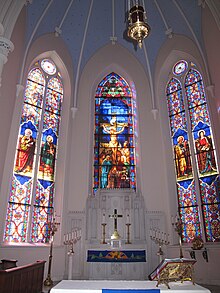Henry E. Sharp
Henry E. Sharp | |
|---|---|
 Henry E. Sharp windows of the "Crucifixion and Four Evangelists" (1872) at St. Matthew's German Evangelical Lutheran Church in Charleston, South Carolina | |
| Nationality | United States |
| Occupation | Stained glass maker and manufacturer |
Henry E. Sharp was a nineteenth-century American stained glass maker active with from c.1850 to c.1897.[1]
Sharp established himself with Steele as a glass stainer at offices at 216 Sixth Avenue.[1]
Beyond New York state, Sharp produced created stained glass windows for churches in Pennsylvania, Connecticut, Rhode Island, Massachusetts, Maine, Ohio, Nebraska, Minnesota, South Carolina, California, the Virgin Islands and Japan.[2]
Like much of the mid-nineteenth-century American stained glass produced in and around Broadway in Manhattan, the stained glass window designs featured full-length painted figures in ornate Gothic canopies, all executed with rich colors.[1]
List of works[]
This list is incomplete; you can help by . (February 2011) |
- Windows (1867–1868) at St. Ann's Episcopal Church in Brooklyn, New York (Renwick & Sands), now the gymnasium of Packer Collegiate Institute; the window "Faith and Hope" was donated to the Metropolitan Museum of Art and is on permanent display in the American Wing.[1]
- Windows (1872) at St. Matthew's German Evangelical Lutheran Church in Charleston, South Carolina. The Henry E. Sharp chancel windows survived the church fire of January 13, 1965.
- Windows (1878) at St. Mary's Episcopal Church in Green Cove Springs, Florida.
- Altar Windows (1868) and Good Shepherd Window (1872) at St. Matthew's Episcopal Church in Hillsborough, North Carolina.
- "Consolation" Window in the middle of the south nave wall, after 1877. Christ Church in Raleigh, North Carolina. Made by Henry E. Sharp & Sons, New York.[3] Two similar windows in the south wall, one nearest the narthex ("Blessed are the pure in heart") and one in the chancel ("Nearer my God to thee"), may also be Sharp windows. All three windows were given by the Battle family within a similar time frame.[4]
- Altar windows (1856), St. Luke's Episcopal Church, Jacksonville, Alabama.[5]
References[]
- ^ a b c d The Metropolitan Museum of Art, American Art, Info Panel, #4553
- ^ Jennifer Lee Cadero-Gillette, "Henry Sharp in Pre-Opalescent America," Stained Glass Quarterly (Summer 1990), 130-136.
- ^ Christ Church archives.
- ^ To the Glory of God: Christ Church. Author Davyd Foard Hood, 1997. pp 188-189
- ^ A History of Saint Luke's Episcopal Church, Jacksonville, Alabama, 1844-1994. Author, Ronald J. Caldwell, p. 63
Categories:
- American stained glass artists and manufacturers
- Companies based in Manhattan
- American companies established in 1850
- American companies disestablished in 1897
- Defunct companies based in New York City
- Culture in Belfast
- Manufacturing companies disestablished in 1897
- Manufacturing companies established in 1850